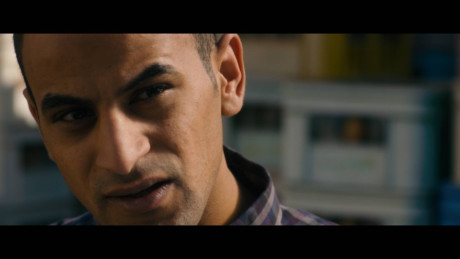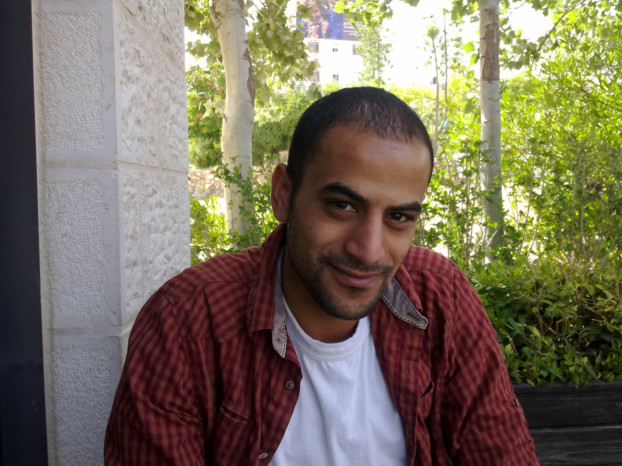
After the international success of the Palestinian film, “Omar”, which not only received rave reviews but also an Oscar nomination in the category of Best Foreign Language Film, life has resumed a state of normalcy for Iyad Hourani, who played the role of Tareq, and who nowadays finds himself unemployed, desperate and doing menial jobs in the construction industry to make ends meet — one of the themes the film vividly depicted.
Juxtapose this with Hollywood and Bollywood, where actors struggle, pay their dues and when fame and fortune beckons, not only do they climb the ladder of success but they experience a meteoric rise to the top.
But in Palestine — after being whisked off with grand appearances on the international stage and being blinded by the spotlights in the film capitals of the world, Hourani is today a disillusioned young man, facing the facts of his life under occupation, so desperate that he begins by saying, “I am looking for work in Israel, to go to build colonies.”
The young man destined to act, begins to relate his life story: “I schooled in Hebron and began acting at 14, with ‘Days for Theatre’, where I took part in small productions, ‘kids for kids’ — the actors were kids and the audience was made up of kids. I knew then that acting was for me, but after completing high school, there were no opportunities for me, so I went to Ramallah and studied business for two years, but did not complete my studies.”
“After I heard about the opening of The Freedom Theatre in Jenin, the first acting school in Palestine, I quit and headed north to pursue my dream. There I met Juliano, who had set up the theatre with Zubeidi, and immediately felt I belonged.”
Adding a philosophical note, he says, “For the next three years I worked as a waiter while I studied. Life in Jenin was hard and it was all about resistance through art, how to present your identity as a Palestinian artiste, how to use art to develop your society, to change your community and then your circumstances under occupation.”
During this period, Hourani completed his studies in Theatre Arts Education at the Freedom Theatre in cooperation with the Arab-American University in Jenin, a mixture of academics and acting.
He played the role of the Mad Hatter in a production of “Alice in Wonderland”, Squealer in “Animal Farm” and a host of other local plays. He also travelled and attended many drama and acting workshops in theatres across the world, among them — Shopene Theatre in Germany, National Theatre in Vienna, and Public Theatre in New York.
Hourani continues, “In 2011 Juliano was shot and killed in Jenin by masked gunmen, as he was leaving The Freedom Theatre, which he founded. It was a huge blow to all of us and theatre and art changed forever. He was the godfather and we were left stranded without his illuminating presence.
“I couldn’t remain in Jenin. The logic of theatre had changed. We were doing something different. Being afraid, everyone went back to working with kids instead of being affirmative like when Juliano was alive.”
Hourani then headed back to Ramallah, where he found work with Ashtar Theatre and acted in two productions, one of which was “Richard 11”, which took him to the United Kingdom, where he performed at The Globe.
He proudly affirms, “I played the role of Percy, son of Northumberland. It was an Arabic version and it got lots of attention.”
Coming home, he continued with odd jobs, performances, and dabbled with training and directing, which all led to the release of his first short film, which he titled, “C the C” – a five minute film about a Palestinian who dons a scuba diving outfit and walks to the Kalandia Checkpoint where he is received by a friend who pours a bottle of water on him.
Hourani smiles, adding, “This film participated in The World Festival of Short Films in Bosnia where it received a special mention, as well as in Dubai. In Mexico, it won an award for best short film.”
At one stage of his life, Hourani even worked as a clown, touring Palestinian hospitals and bringing joy and laughter to patients, especially children.
To compound matters, Hourani married a Tunisian, about whom he says with a huge smile, “I found her on Facebook, before ‘Omar’ and we have a one year old daughter, Miral. She is here on a one-year visa and we are worried that when it expires, she may be sent back to her country. At the moment, she teaches French at a local school”.
And then his big break came with ‘Omar’. The director, Hany Abu Assad, found him after friends told him that auditions were taking place.
Hourani explains, “I got the role from my first audition. It was my first big film and we worked on it for about 5 months. The experience was amazing. I was proud to do a film in Palestine in the company of a crew of fellow Palestinians. It even made me feel like I was back in time with Juliano in Jenin. Work with Hany was really nice. He was open and gave me all the freedom to put my soul into acting out the part of Tareq.”
Hourani says he is quite like Tareq in his passion for taking risks to change his life, “but I cannot hold a gun. That is where we are different. We possess the same soul but our methods differ. He is killed struggling but my way is through art. Still Tareq is one of us, with a different face.”
Hourani did not think that “Omar” would make it big and only saw it for the first time in Cannes at the screening. When asked about the reaction, he animatedly explains, “It made the audience tense, like our situation. This is what ‘Omar’ achieves for me. The audience got the feeling. Art is about feeling, not thinking. We are human, we feel first and think afterwards.”
“‘Omar’ is tense, dangerous and we don’t know what’s going on: Who to trust? How to survive? How can we be free? Art and film asks all those questions.”
Hourani then places himself in the present, after begging for more cigarettes from admirers and there is no shortage of them, he says, “I went to Los Angeles for the Oscars, Dubai and Toronto for the film festivals and I became a star outside Palestine. Then coming back, the reality hits you in the face and disappointment rules your life. I keep asking myself that to achieve something after taking such a huge step and with nothing coming out of it, was it all worth it?”
A Palestinian actor, caught up in the struggle, Hourani really believes that theatre provides a platform to empower and a voice to the voiceless. Also, that only art can change and transform the world into a better place, free from fear and violence.
The theatre and film world has not heard the last of Iyad Hourani; he is young and determined and looks like he will make it against the immeasurable odds stacked against him.
– Rafique Gangat, author of “Ye Shall Bowl on Grass”, is based in occupied Jerusalem













